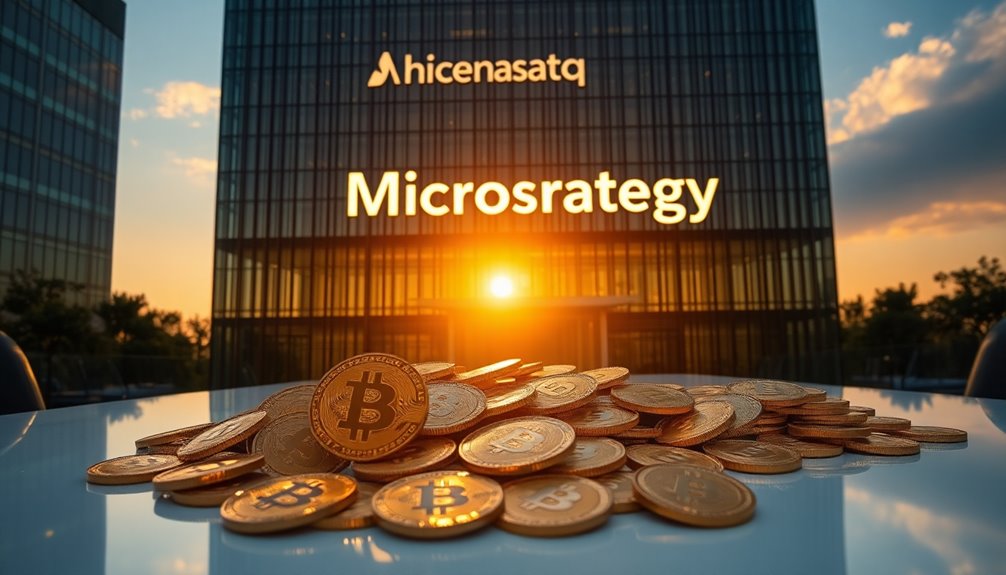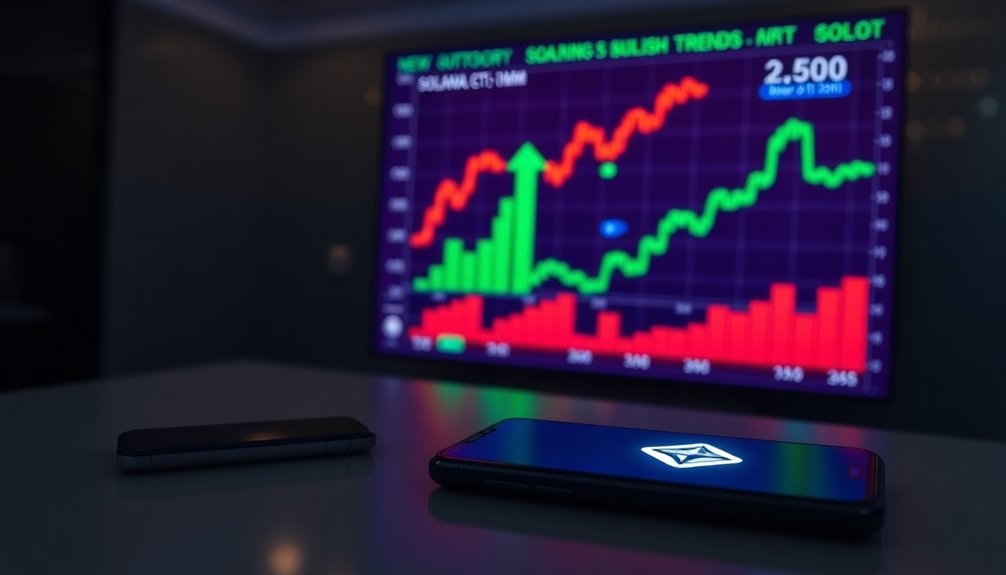MicroStrategy's latest $1.5 billion purchase of Bitcoin adds 15,350 BTC to its impressive stash, demonstrating its relentless commitment to the cryptocurrency. With a total of 439,000 BTC, MicroStrategy is now the second-largest public holder, making up nearly 2% of Bitcoin's entire supply. This acquisition follows a series of purchases in recent weeks, reflecting their ongoing strategy to enhance holdings. Despite some challenges in financial performance, the company's stock has soared significantly, drawing attention from institutional investors. If you're curious about how this impacts the broader market and MicroStrategy's future plans, there's more to uncover.
Key Takeaways
- MicroStrategy purchased 15,350 BTC for $1.5 billion between December 9-15, 2024, marking its sixth acquisition in six weeks.
- This latest purchase elevated MicroStrategy's total Bitcoin holdings to 439,000 BTC, nearly 2% of Bitcoin's total supply.
- The average purchase price for the recent Bitcoin acquisition was $100,386 per Bitcoin, raising the overall investment to $27.1 billion.
- MicroStrategy's stock surged 540% in 2024, reflecting strong market interest and performance, with inclusion in the Nasdaq 100 expected.
- Institutional adoption of Bitcoin is increasing, with companies like BlackRock and Fidelity entering the market, driven by MicroStrategy's influence.
Recent Purchase Details

MicroStrategy recently made headlines with its latest Bitcoin purchase, spending a staggering $1.5 billion to acquire 15,350 BTC between December 9th and 15th, 2024. This acquisition saw an average price of $100,386 per Bitcoin, reflecting a strategic move during a period of notable price rallies in the crypto market.
You might find it interesting that the funds for this purchase came from a mix of equity and debt financings, as well as cash flows from operations. In total, MicroStrategy's overall expenditure on Bitcoin has reached a remarkable $27.1 billion, underscoring their commitment to this digital asset.
MicroStrategy has consistently leveraged its financial strategies, borrowing $7.27 billion through convertible debt securities to fund its Bitcoin endeavors. This recent buying spree marks the sixth acquisition in just six weeks, showcasing the company's aggressive approach to accumulating Bitcoin as its primary treasury reserve asset.
Keep in mind that such high-stakes investments can lead to increased volatility in both Bitcoin prices and MicroStrategy's stock. Their strategy seems to be attracting institutional investors, further influencing the market dynamics.
However, with the heightened scrutiny surrounding their leveraged tactics, MicroStrategy remains a significant player in the evolving landscape of cryptocurrency investments.
Total Bitcoin Holdings Overview

With a remarkable total of 439,000 BTC, MicroStrategy stands as the second-largest holder of Bitcoin in public markets, trailing only behind BlackRock's iShares Bitcoin Trust. This impressive amount represents nearly 2% of Bitcoin's total supply of 21 million, valued at over $45 billion.
MicroStrategy began its Bitcoin journey in 2020, steadily increasing its holdings through strategic investments. The company has invested a total of $27.1 billion in Bitcoin, averaging an acquisition cost of $61,725 per BTC. Notably, MicroStrategy's recent acquisition consisted of 15,400 bitcoins at an average price of $95,976 each.
To finance these purchases, it's utilized proceeds from equity and debt financings, alongside cash flows from operations. In fact, MicroStrategy recently raised $1.5 billion through an equity offering of 3,884,712 shares, with around $7.65 billion in shares still available under its offering plan.
MicroStrategy's substantial Bitcoin holdings position it as a key influencer in the digital currency market, benefiting from the growing institutional adoption of Bitcoin. Its dominance in this space not only strengthens its market presence but also attracts potential institutional investors looking to capitalize on Bitcoin's growth.
Financial Performance Highlights

In the latest financial report, MicroStrategy revealed a mixed performance in its revenues and expenses. For Q2 2024, total revenues reached $111.4 million, marking a 7.4% decline year-over-year.
While subscription services revenues increased by 21.1% to $24.1 million, product licenses and subscription services saw a 5.7% decrease to $33.4 million. Product support revenues fell by 6.6% to $61.7 million, and other services revenues dropped by 13.7% to $16.3 million.
Gross profit for Q2 2024 was $80.5 million, translating to a gross margin of 72.2%. However, this was a decrease from 77.5% in the same period last year.
Operating expenses skyrocketed by 134.0% year-over-year to $280.8 million, driven partly by $180.1 million in impairment losses on digital assets. Additionally, the company reported a total bitcoin holding of 226,500 BTC valued at $14.016 billion, highlighting its substantial investment in the cryptocurrency.
The net loss for Q3 2024 was significant at $340.2 million, reflecting the impact of the rising operating expenses and ongoing impairment losses.
With operating losses mounting, MicroStrategy faces challenges in maintaining profitability amidst its aggressive Bitcoin acquisition strategy.
Market Influence and Impacts

The ripple effects of MicroStrategy's Bitcoin acquisitions extend far beyond its own balance sheet, significantly influencing market dynamics. When the company purchased 15,350 BTC for $1.5 billion, Bitcoin's price surged, reaching a new all-time high above $107,000. This kind of price appreciation highlights how MicroStrategy's aggressive strategy not only benefits its own holdings but also fosters optimism in the broader market.
As more institutional investors take note of MicroStrategy's moves, they're likely to consider Bitcoin as a viable investment option. The firm's leadership in Bitcoin holdings sets a precedent, encouraging others to explore similar investments. Consequently, institutional funds and ETFs may ramp up their exposure to Bitcoin, further supporting its price rally. Additionally, MicroStrategy's total Bitcoin holdings now exceed 439,000 BTC, showcasing its significant influence on the cryptocurrency market.
You can also see a clear connection between MicroStrategy's Bitcoin investments and its stock performance. With a staggering 540% increase in stock price this year, the company's financial success is closely tied to Bitcoin's market performance.
MicroStrategy's actions are reshaping investor attitudes and could even influence future regulatory standards for cryptocurrencies, making its market impact more profound than many realize.
Nasdaq-100 Inclusion Announcement

MicroStrategy's strong performance in the cryptocurrency space has paved the way for its upcoming inclusion in the Nasdaq 100 index, a significant milestone for the company. Effective December 23, 2024, MicroStrategy will join other tech firms like Palantir Technologies and Axon Enterprise as part of this prestigious index.
To qualify for inclusion, MicroStrategy met specific criteria, such as being listed exclusively on Nasdaq, maintaining a significant average daily trading volume, and staying current with its quarterly and annual reporting.
This inclusion is crucial as it not only highlights MicroStrategy's growth but also positions it for greater visibility among investors. The Nasdaq 100 index is known for representing leading non-financial companies, and being part of this list can enhance MicroStrategy's credibility in the market. Furthermore, the index is heavily weighted towards the technology sector, which will likely benefit MicroStrategy as it continues to expand its footprint in the crypto space.
Additionally, inclusion in the index means MicroStrategy will be featured in popular exchange-traded funds (ETFs), like the Invesco QQQ Trust ETF, further broadening its investor base.
As the Nasdaq 100 undergoes annual reconstitution, MicroStrategy's addition reflects its robust market performance, signaling a promising future for both the company and its Bitcoin strategy.
Implications of Nasdaq-100 Inclusion

Inclusion in the Nasdaq-100 index signals a transformative shift for MicroStrategy, unlocking new opportunities and potential growth. This status typically boosts stock prices, and as MicroStrategy joins the Invesco QQQ Trust ETF, you can expect significant passive inflows.
With the stock surging over 547% in 2024, outpacing the S&P 500, the company’s market cap has swelled to nearly $98 billion. This inclusion not only improves market liquidity but also expands MicroStrategy’s capital and bitcoin buying program. Additionally, the company has emerged as a major player in the cryptocurrency space due to its substantial bitcoin holdings. The company’s bullish stance on bitcoin has caught the attention of industry insiders, including Pantera Capital founder, Dan Morehead, who has commended MicroStrategy’s forward-thinking approach. Morehead praised the company for its strategic investment in bitcoin, citing it as a bold move that has positioned MicroStrategy as a leader in the digital asset space. As the company continues to expand its bitcoin buying program and grow its market cap, its influence in the cryptocurrency market is only expected to increase.
The heightened visibility and recognition could set the stage for potential inclusion in the S&P 500 in 2025. As more investors focus on MicroStrategy, the scrutiny over its bitcoin holdings and market strategy will increase.
Furthermore, analysts anticipate that this move will bolster the company's prospects, especially since its bitcoin investments have transformed it into a proxy for the cryptocurrency.
With approximately 439,000 bitcoins valued at over $42 billion, MicroStrategy's fortunes are tightly connected to bitcoin's performance. This dynamic relationship enhances both MicroStrategy's stock appeal and its market value, making it a pivotal player in the evolving landscape.
Future Strategy for Bitcoin

With MicroStrategy's recent entry into the Nasdaq-100, the spotlight's on how the company will navigate its future strategy for Bitcoin.
You'll want to keep an eye on long-term price projections, as analysts like Bernstein foresee Bitcoin reaching $200,000 by 2025, fueled by robust ETF inflows. This potential price surge aligns with your strategy, especially given the increasing institutional demand and favorable economic conditions. Additionally, the 90% of Fidelity's institutional clients show interest in cryptocurrency investments, highlighting a growing trend that could further drive Bitcoin's value.
It's crucial to monitor market drivers, such as strong ETF approvals and the overall growth of crypto adoption.
These factors could significantly enhance Bitcoin's value, making it a key asset in your portfolio. However, be aware of the risks; volatility and market corrections remain a concern. You might experience short-term pullbacks that can affect your holdings.
Technological advancements will also play a pivotal role.
Innovations like the Lightning Network can boost Bitcoin's usability, while scalable solutions are vital for its integration into traditional finance.
Institutional Adoption of Bitcoin

A growing number of institutional investors are embracing Bitcoin as a legitimate asset class, reshaping the landscape of cryptocurrency. Major financial institutions like BlackRock, Fidelity, and Franklin Templeton have jumped into the Bitcoin ETF space, attracting billions in investments.
BlackRock’s iShares Bitcoin Trust launched in January 2024 and saw over $21 billion in inflows by May. This surge in interest indicates a growing confidence in Bitcoin, often dubbed “digital gold,” as a viable financial instrument. Institutional adoption of Bitcoin surged in 2021, highlighting the increasing acceptance of digital assets by major players in the market. This newfound enthusiasm is further underscored by bitcoin bull run analysis, which typically examines price trends and market sentiment during periods of rapid growth. As institutional investors continue to enter the space, analysts are keenly observing how these dynamics will influence the market’s volatility and overall trajectory. The ripple effect of such investments could solidify Bitcoin’s position as a core asset in diversified portfolios, transforming perceptions and paving the way for a more robust cryptocurrency ecosystem.
Corporations such as Tesla and Block are also adding Bitcoin to their balance sheets, reflecting broader institutional acceptance. Legendary hedge fund managers like Paul Tudor Jones and George Soros have incorporated Bitcoin into their portfolios, further legitimizing its status in the investment community.
The U.S. stands as a global leader in crypto adoption, bolstered by a favorable regulatory environment and significant institutional transfers, with around 70% of North America's crypto activity involving transactions over $1 million.
Clear regulatory frameworks are essential for sustained institutional support, driving growth in the crypto industry. This evolving landscape positions Bitcoin as a key asset for institutional investors seeking diversification and hedging opportunities.
MicroStrategy's Aggressive Buying Trend

MicroStrategy's strategy for accumulating Bitcoin has been nothing short of aggressive, showcasing its commitment to this digital asset. Since its initial investment of $250 million in August 2020, the company has consistently ramped up its holdings. You can see this trend with purchases like the 29,646 BTC acquired in December 2020 for $650 million, and more recently, the staggering 27,200 BTC bought in November 2024 for over $2 billion.
To fund these aggressive acquisitions, MicroStrategy has employed various strategies. They've utilized convertible senior note offerings, raised significant capital through common stock issuance, and engaged in ATM activities, raising over $2 billion. This strategic financing allows them to continue buying Bitcoin at a rapid pace. Additionally, their strategy highlights the growing institutional acceptance of Bitcoin, especially following the SEC's approval of Spot Bitcoin ETFs in January 2024.
As of December 15, 2024, their total holdings reached 439,000 BTC, valued at over $45 billion, with an average purchase price of $61,725 per BTC. MicroStrategy's total investment in Bitcoin stands at $27.1 billion, highlighting their unwavering belief in the asset's long-term potential.
With this aggressive buying trend, it's clear that MicroStrategy aims to solidify its position as a leading institutional holder of Bitcoin.
Outlook for MicroStrategy's Stock

Given the current dynamics of MicroStrategy's stock, investors should analyze both short-term and long-term forecasts to gauge potential performance. Currently priced at $1,752.71, MicroStrategy is expected to see an 8% rise by the end of 2024, reaching approximately $1,899. However, this reflects a significant year-over-year decline of 28%.
In the short term, you might witness price fluctuations, with a possible peak of $524.15 in the next five days based on varying data. Additionally, forecasts indicate that the stock price has already increased by 571% since the start of 2024, showing the volatility and potential growth in the coming months.
Looking ahead, the mid-term projections are more optimistic, with prices anticipated to hit $1,964 in early 2025 and potentially soar to $2,553 by year-end. This could represent a substantial 102% to 156% increase from the current levels.
Long-term forecasts suggest even more promising growth, with potential prices ranging from $2,638 to $3,569 by 2025 and continued appreciation driven by Bitcoin's performance and MicroStrategy's strategic initiatives.
However, keep an eye on financial performance indicators, like the total revenue dip and increased operating costs, as they could impact stock sentiment. Understanding these dynamics will help you make informed investment decisions.
Frequently Asked Questions
How Does Microstrategy's Bitcoin Strategy Differ From Other Companies?
MicroStrategy's Bitcoin strategy stands out because it actively leverages debt and equity to fund its acquisitions, unlike most traditional companies that prefer stable investments.
You'll notice they've significantly increased their share count and borrowed billions through convertible bonds, exposing themselves to Bitcoin's volatility.
This aggressive approach contrasts with firms focusing on diversified portfolios, making MicroStrategy's financial health directly tied to Bitcoin's performance, heightening both risk and potential rewards.
What Risks Does Microstrategy Face With Its Bitcoin Investments?
When you consider MicroStrategy's Bitcoin investments, you'll see several risks they face.
Market volatility can lead to significant price swings, impacting their holdings' value.
Regulatory changes can create uncertainty and affect trading.
Security risks from hacks threaten their substantial assets.
Financially, high exposure and rising interest rates could strain their debt obligations.
Each of these factors complicates their strategy, making it crucial for them to navigate these challenges carefully.
How Does Bitcoin's Market Volatility Affect Microstrategy's Financial Health?
Bitcoin's market volatility significantly impacts MicroStrategy's financial health. When Bitcoin prices fluctuate, so does MicroStrategy's stock value, exposing you to potential losses.
If Bitcoin drops sharply, it could affect investor confidence and market liquidity, leading to a decline in shares. However, MicroStrategy's strong liquidity position helps mitigate short-term risks, allowing it to withstand some volatility.
Ultimately, your investment's success hinges on Bitcoin's long-term performance and market dynamics.
Can Microstrategy's Bitcoin Holdings Impact Its Overall Business Operations?
MicroStrategy's bitcoin holdings can significantly impact its overall business operations.
When bitcoin's value fluctuates, it directly influences your company's stock price and market cap. If you experience forced sales to meet financial obligations, it could lower bitcoin prices and harm your stock.
However, by leveraging these holdings as a treasury reserve asset, you can capitalize on potential gains while also facing the inherent risks of market volatility and financial exposure.
What Are Potential Regulatory Challenges Microstrategy May Encounter With Bitcoin?
You might face several regulatory challenges with Bitcoin, including stricter compliance with global cryptocurrency regulations.
The SEC could scrutinize your offerings, impacting operations. Additionally, adhering to anti-money laundering regulations and international financial reporting standards is crucial.
You'll also need to navigate the complexities of cross-border regulations, which vary by country.
Market volatility and potential dilution of stockholders due to BTC purchases could further complicate compliance and financial stability for your business.
Conclusion
In conclusion, MicroStrategy’s latest $1. 5 billion Bitcoin purchase underscores its commitment to becoming a leading player in the cryptocurrency space. With a growing portfolio and the recent Nasdaq-100 inclusion, the company’s strategy is clearly paying off. As institutional adoption of Bitcoin continues to rise, MicroStrategy’s aggressive buying trend positions it well for future growth. Keep an eye on how these developments impact both Bitcoin and MicroStrategy’s stock performance in the months ahead. As the market evolves, investors may gain earlystage bitcoin boom insights that could shape their strategies in this rapidly changing landscape. MicroStrategy’s bold moves not only reflect its strong belief in Bitcoin’s potential but also signal confidence to other institutional players considering entry into the market. This environment of increased interest and investment could lead to significant fluctuations in Bitcoin’s valuation, making it crucial for stakeholders to remain informed and adaptive.









